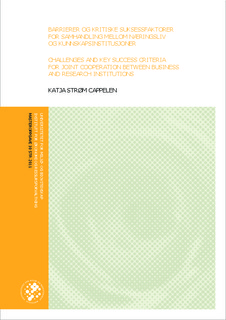| dc.description.abstract | Oppgavens problemstilling bygger på en hypotese om at det samarbeides mindre på tvers av sektorer i utvikling av innovasjonsprosjekter enn hva samfunnet er tjent med. Det stilles spørsmål til hvorfor det er slik, hvilke flaskehalser som eventuelt hindrer økt grad av samhandling og hva som skal til for å senke terskelen. Videre drøftes integrert samarbeid på tvers av sektorer som et viktig bidrag til bærekraftig utvikling gjennom fremvekst av flere kunnskapsintensive entreprenører og virksomheter. Temaet er i det følgende avgrenset til å belyse samhandling mellom næringsliv og kunnskapsinstitusjoner. Det offentliges rolle som tilretteleggende tredjepart er i oppgaven satt som forutsetning for dette samarbeidet.
Det er benyttet et åpent, eksplorativt metodedesign. Data er hentet inn gjennom tjuefire kvalitative intervjuer med danske og norske representanter fra kunnskapsinstitusjoner, næringsliv og innovasjonsmiljøer.
Et viktig funn er behov for at det legges til rette for mer differensierte samarbeidsmodeller mellom universiteter og næringsliv. For å løse de virkelig radikale utfordringene vi står overfor er det viktig at rett kunnskap kommer i spill hos dem som vet å foredle og nyttiggjøre kunnskapen. Det argumenteres for at det bør åpnes opp for en mer nyansert forståelse av kilder til kunnskap og innovasjon i en utvidet forståelse av innovasjonssystemer.
Et annet hovedfunn er at det er grunn til å tro at de største barrierene for samhandling i mindre grad handler om ressursknapphet, og mer om aktørenes innstilling og fordommer overfor hverandre.
Behov for utvikling av kompetanser som tradisjonelt ikke har vært pensum ved universiteter, fremstår som et tredje hovedfunn i undersøkelsen. Det må en bevissthetsendring til for å fremme entreprenørskapskultur og betydningen av interdisiplinært samarbeid på tvers av sektorer og fagdisipliner.
ABSTRACT: The object of this paper is to discuss collaboration across sectors as an important contribution towards sustainable development. It is often argued that less integrated, cross-sectoral collaboration is performed in the development of innovative projects as to what would benefit society as a whole. The question is why that is, which bottlenecks are preventing a higher degree of collaboration, what will be required to minimize the obstacles, and what are the key drivers for joint cooperation between business and research institutions? The research topic is in this paper confined to the analysis of the collaboration between business and research institutions as a means for sustainable development through enabling more knowledge intense entrepreneurs and enterprises. In this context, government’s role as a facilitating third party is set as a given premise.
The study is conducted with an open, exploratory research design outline. Data is collected through twenty-four qualitative interviews with representatives from Danish and Norwegian research institutions and universities, private businesses and governmental innovation environments.
One significant conclusion is that there is a need for enabling more divers forms of collaboration between universities and external partners. To be able to develop solutions to cope with real pressing needs that society is facing, it is crucial that those who comprehend how to handle and implement radical innovations are given access to the right knowledge. It is in this paper argued that there is a need for a more nuanced view on sources of knowledge and innovation in an extended understanding of systems of innovation.
Another key conclusion is that the main obstacle for collaboration seems to point less towards the shortages of resources and more in the direction of attitude and prejudices.
The need for developing skills that traditionally do not occur in a university curriculum stands out as a third main conclusion. There is a need for developing and implementing a culture that will support and encourage entrepreneurial and innovative thinking. Last, but not least the importance of interdisciplinary collaborations across sectors and disciplines must be enhanced. | no_NO |
